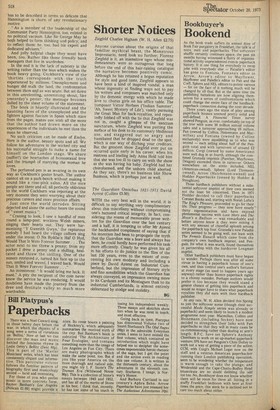Bookbuyer's
Bookend
As the book trade suffers its annual dose of Book Fair purgatory in Frankfurt, the talk is of mice, men and paperbacks. The softcover shuffle certainly continues apace, the past six months having witnessed a flurry of organisational activity unprecedented even in paperback history. It is one thing for everybody to swop jobs with everybody else — Paladin's editor has gone to Fontana, Fontana's editor to Arrow, Arrow's editor to Mayflower, Mayflower and Paladin's editor to Pan and the Corfi, Sphere and NEL editors to points various — for on the face of it nothing much will be changed by all that. But at the same time the publishing battalions are now aligning themselves for a series of confrontations which could change the entire face of the hardbackpaperback connection during the next decade.
Three years ago the state of play among paperback houses seemed pretty sold and well-defined. A Financial nmes survey showed Penguin, as ever, comfortably on top of the tree with some 30 million annual volume sales and a turnover approaching £6 million. Pan (owned by Collins, Heinemann and Macmillan) and Fontana (owned by Collins exclusively) were squabbling as to who was second — each selling about half of the Penguin total and with turnovers of around £2 million. Corgi (owned by some Americans) were well dug in at fourth, although the cornbined Granada imprints (Panther, Mayflower, Dragon) exceeded them in turnover. Others somewhere on the scene included, NEL (American-owned), Sphere (Lord Thomsonowned), Arrow (Hutchinson-owned) and Hodder Paperbacks (owned by Hodder & .Stoughton). Those hardback publishers without a substantial softcover imprint of their own seemed not the least bit concerned. Then in 1971 Hodder decided to call their paperbacks Coronet Books and, starting with Norah Lofts's The King's Pleasure, proceeded to go for their life. Their progress — they now have nearly' thirty representatives and have enjoyed phenomenal success with Love Story and The Moon's a Balloon — was remarkable and before anyone knew it they were mixing it with any amount of cheerful aplomb among the paperback top four. Granada's new Paladin series seemed to be going well, not least with The Female Eunuch which came from the company's own hardback imprint, and Penguin, for what it was worth, found themselves in partnership with the hardcover Longman imprint. Other hardback publishers must have begun to wonder. Perhaps there was after all some virtue in having a paperback house of one's own, and thus control one's author's fortunes at every stage (as used to happen years ago anyway) rather than licence paperback rights to a choosy outsider. Perhaps authors would prefer it too because they would stand a greater chance of getting into paperback and would no longer have to share what paperback royalties they did earn with their hardback publisher. At any rate, W. H. Allen decided this Spring to join the softcover scene (though their successful Made Simple series was already in paperback) and seem likely to launch a modest programme next year. Macmillan, Collins and Heinemann (including Secker) have now decided to strengthen their links with Pan paperbacks so that they will in many cases be co-commissioning rather than dealing at arm's length. B.P.C. have set Sphere's Anthony Cheetham to work on an up-market paperback venture; IPS have set Penguin's Chris Dolley to
work out a way of getting a piece of the action; CCM, with Corgi's Michael Legat now on the
staff and a veteran American paperbacker running their London publishing operation, seem to be wondering whether the temperature is warm enough to take the plunge; and Weidenfeld and the Cape-Chatto-Bodley Head triumvirate are no doubt dabbling the odd toe too. No, Bookbuyer does not know whether there will be room for them all. Sitting in a stuffy Frankfurt bedroom with beer at four times the price, this week he is inclined not to care too much about either. '


































































 Previous page
Previous page